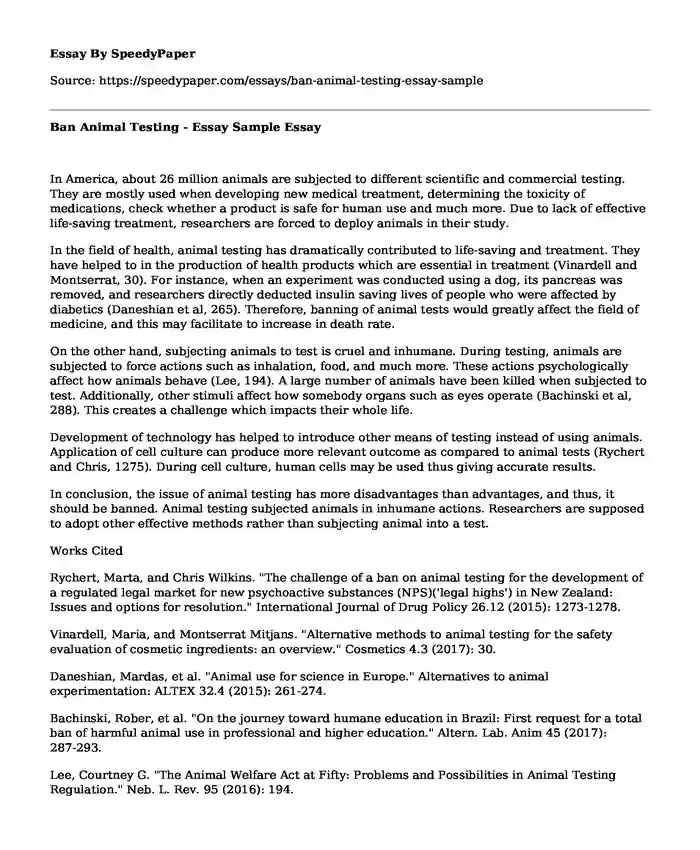In America, about 26 million animals are subjected to different scientific and commercial testing. They are mostly used when developing new medical treatment, determining the toxicity of medications, check whether a product is safe for human use and much more. Due to lack of effective life-saving treatment, researchers are forced to deploy animals in their study.
In the field of health, animal testing has dramatically contributed to life-saving and treatment. They have helped to in the production of health products which are essential in treatment (Vinardell and Montserrat, 30). For instance, when an experiment was conducted using a dog, its pancreas was removed, and researchers directly deducted insulin saving lives of people who were affected by diabetics (Daneshian et al, 265). Therefore, banning of animal tests would greatly affect the field of medicine, and this may facilitate to increase in death rate.
On the other hand, subjecting animals to test is cruel and inhumane. During testing, animals are subjected to force actions such as inhalation, food, and much more. These actions psychologically affect how animals behave (Lee, 194). A large number of animals have been killed when subjected to test. Additionally, other stimuli affect how somebody organs such as eyes operate (Bachinski et al, 288). This creates a challenge which impacts their whole life.
Development of technology has helped to introduce other means of testing instead of using animals. Application of cell culture can produce more relevant outcome as compared to animal tests (Rychert and Chris, 1275). During cell culture, human cells may be used thus giving accurate results.
In conclusion, the issue of animal testing has more disadvantages than advantages, and thus, it should be banned. Animal testing subjected animals in inhumane actions. Researchers are supposed to adopt other effective methods rather than subjecting animal into a test.
Works Cited
Rychert, Marta, and Chris Wilkins. "The challenge of a ban on animal testing for the development of a regulated legal market for new psychoactive substances (NPS)('legal highs') in New Zealand: Issues and options for resolution." International Journal of Drug Policy 26.12 (2015): 1273-1278.
Vinardell, Maria, and Montserrat Mitjans. "Alternative methods to animal testing for the safety evaluation of cosmetic ingredients: an overview." Cosmetics 4.3 (2017): 30.
Daneshian, Mardas, et al. "Animal use for science in Europe." Alternatives to animal experimentation: ALTEX 32.4 (2015): 261-274.
Bachinski, Rober, et al. "On the journey toward humane education in Brazil: First request for a total ban of harmful animal use in professional and higher education." Altern. Lab. Anim 45 (2017): 287-293.
Lee, Courtney G. "The Animal Welfare Act at Fifty: Problems and Possibilities in Animal Testing Regulation." Neb. L. Rev. 95 (2016): 194.
Cite this page
Ban Animal Testing - Essay Sample. (2022, Dec 15). Retrieved from https://speedypaper.net/essays/ban-animal-testing-essay-sample
Request Removal
If you are the original author of this essay and no longer wish to have it published on the SpeedyPaper website, please click below to request its removal:
- Immigration Policy Essay Sample
- Pipeline Transportation Essay Sample
- Ethical Principles in Business - Free Essay for Your Inspiration
- Essay Example: Interest Rates and Inflation in the United States
- Essay Example on The Fault in Our Stars by John Green
- Free Essay: Truancy, Grade Point Average and Sexual Activity
- Free Paper Sample on Perioperative Risk Assessment
Popular categories





